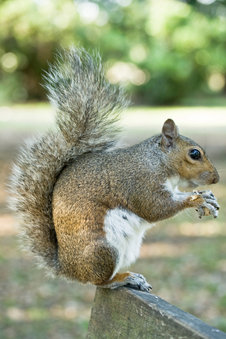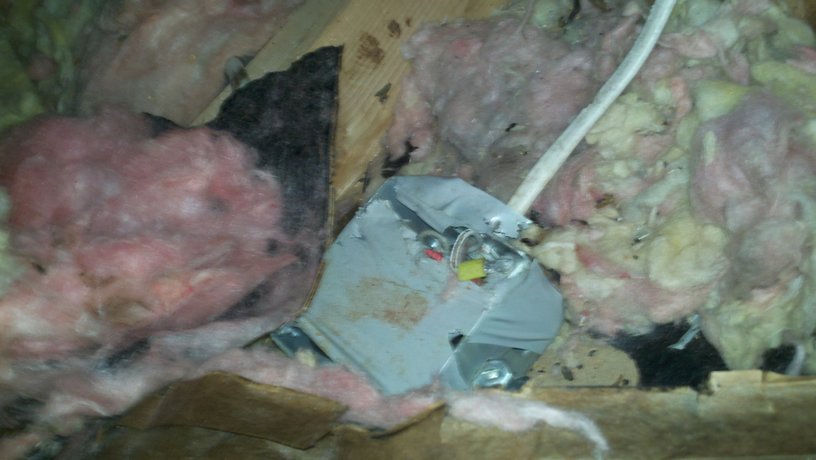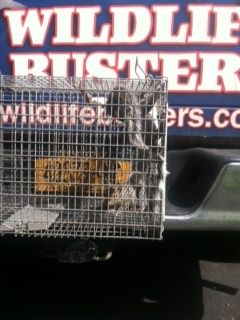The Gray Squirrel
 Welcome Fall!! Hello readers, we apologize for the lack of information over the past few months. We are growing and improving, and welcomed a few new employees. Please welcome, Tracy Singh who is our customer service specialist and Joseph Galm, our new Wildlife Technician. We are excited to welcome them to the team and we are confident that you will enjoy working with them as much as we have.
Welcome Fall!! Hello readers, we apologize for the lack of information over the past few months. We are growing and improving, and welcomed a few new employees. Please welcome, Tracy Singh who is our customer service specialist and Joseph Galm, our new Wildlife Technician. We are excited to welcome them to the team and we are confident that you will enjoy working with them as much as we have.
Fun Animal Facts
Gray squirrels are called “living fossils” becuase they haven’t changed much in 37 million years.
As I sit here and take note of the warm fall we are having, I am noticing all of the wondrous nature out there enjoying it too…especially those gray squirrels. Just look at them running up and down the trees, jumping from one to the other. And have you noticed there are little ones running around too. Yes, that’s right, the second litter is just emerging from the nest. Squirrels are rodents and as we all know, rodents tend to produce exponentially and the gray squirrel is no exception.
The gray squirrel breeds twice a year, from mid December through January having young in February and March, and then again from May through June having young in July and August. The baby squirrels leave the nest 10 to 12 weeks thereafter, which is why you are seeing so many little ones this time of year (or at least in my back yard there appears to be an over-abundance). And of course this is just in time for them to be searching and seeking a nice warm place to spend the winter and your attic makes the perfect residence.
Gray Squirrels are typically 18” to 20” long with the tail being half of that length weighing 1 to 1.5lbs. They are gray above and white below and in the summer their head, legs and sides become washed with tawny brown. Their eye ring is puffy and their tail is long and bushy.
Squirrels are opportunists and their diet through the winter consists of fruits, nuts and birdseed, if available. In early spring, they switch to tree buds, then in summer to fruits, berries and succulent plants. They will also eat insects; bird eggs; mushrooms; corn, garden, orchard and field crops and when very hungry, will chew tree bark and lick the sap.
Squirrel Damage
Squirrels are shrewd and will seek out your home as a nice warm place to spend most of the winter, especially if they become aware of any egress points throughout your home. They will even chew their way through weakened areas of roofs, vents and soffits to find their pathway into your attic. Once inside they can create significant damage. Wildlife Busters Animal Damage Repair and Decontamination Services can assist in permanently resolving your squirrel issue. Some of the most common forms of squirrel damage associated with squirrel infestations are:
- Damage and Shredded insulation
- Feces and urine deposits
- Stains in ceilings from squirrel urine
- Strong odor from urine-soaked insulation.
However, the most dangerous hazard associated with having squirrels in your attic is a fire hazard. Squirrels are destructive by nature and like all rodents they chew on electrical wiring. By chewing on wires they strip the plastic coating, which exposes the bare copper wire and creates a very dangerous situation. This can be avoided by utilizing Wildlife Busters animal trapping and removal services whereby we remove the squirrels from you attic and provide a warranty and prevention plan to ensure that your house is squirrel proofed.
Squirrel Removal and Preventative Services
Wildlife Busters technicians are highly trained in locating all access points of entry for nuisance wildlife removal. Our years of hands on experience have taught us well. Our squirrel removal process includes the following steps:
- Thorough site inspection to locate access points
- Installation of one way doors where necessary as well as set traps for capture (if need be)
- Seal all access points
- Make habitat modification recommendations to property owner
- Offer a long-term warranty and prevention plan.
THINK WINTER SAVINGS
Enjoy a 10% discount on our Winter Rodent Program. Let us know that you read it in our newsletter or like us on facebook (Wildlife Busters) and experience the Think Winter 10% discount! There are so many ways to save! “Tis the season of rodents-
If you are experiencing a nuisance wildlife issue, whether you need squirrel removal, raccoon removal, woodchuck removal, skunk removal, bat removal give Wildlife Busters® a call toll free at 855-945-1212 and we resolve your wildlife management issue professionally, efficiently and humanely. www.WildlifeBusters.com or www.TheBirdBusters.com
And for fun…we hope you enjoy this audio…. Is she serious?? It’s not about rodents but it certainly is funny. I cried, I laughed so hard.
https://www.facebook.com/photo.php?v=4274715858916&set=vb.1016788026&type=2&theater
Community Wildlife Programs and Upcoming Events
Mohonk Preserve
Northern Saw-whet Owls: Mohonk’s Silent Visitor October 25, 2013 Friday, 7-8:30pm. (Rain/wind date: Saturday, October 26th) 7-8:30pm. Geology of the Shawangunk Mountains November 2, 2013 Saturday, 9am-1pm. An Unforgiving Land: Hardscrabble Life in the Trapps November 23, 2013 Saturday, 3-5pm. Tour the Daniel Smiley Research Center December 8, 2013 Sunday, 1:30-3pm. Talk to the Animals December 27, 2013 Friday, 10-11:30am.
Hudson Highlands Nature Museum
I Spy Halloween nature Trail October 26, 2013 Saturday, 12noon-4pm, October 27, 2013 Sunday, 12noon-4pm. Meet Atka – a Live Wolf November 2, 2013 Saturday, 4:30pm & 6pm.
Weinberg Nature Center
Bat & Owl Prowl October 25, 2013 Friday, 6:00-9:00pm. 2013 Fall Festival November 3, 2013 Sunday, 1:00-4:00pm.
The Bear Mountain Zoo
The Bear Mountain Zoo located in the Bear Mountain State Park, NY
“There is no defeat except from within.” Elbert Hubbard



 Receive FREE wildlife Tips!
Receive FREE wildlife Tips!
